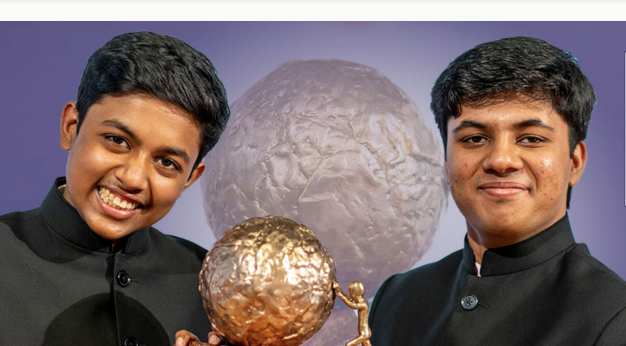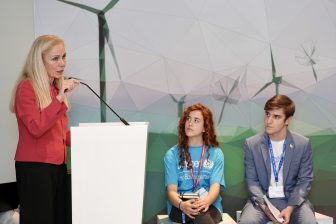
Brothers’ anti-pollution drive spurs Delhi into action
Never underestimate the power of youth – that’s the clear message from the Indian capital, Delhi, where two brothers’ pollution-fighting exploits have spurred the government into action.
It’s only a couple of months since 17-year-old Vihan Agarwal, and his brother Nav, 14, were awarded the prestigious International Children’s Peace Prize by international children’s rights body, KidsRights.
They developed the One Step Greener programme, which started with them segregating rubbish and organising waste pick-up events across the city, one of India’s largest urban centres, and now includes more than 1,000 homes, schools and offices.
No sooner had the brothers been recognised for their efforts than the city’s authorities announced a series of measures to tackle the massive problem of air pollution. That’s according to the man who presented the teenagers with their award, Kailash Satyarthi, an acclaimed activist against child labour and himself one of the winners of the Nobel Peace Prize in 2014.
The KidsRights organisation recently reported government officials as saying that breathing in Delhi was ‘the equivalent to to smoking 20 cigarettes a day’, before adding that they now ‘realise the seriousness of the situation’.
Satyarthi believes ‘the turnaround by the Delhi government is no coincidence’, adding: “I assume that Delhi felt obliged to take draconic measures against air pollution due to Nav and Vihaan.” KidsRights says that in 2020 Delhi became the world’s most polluted capital for the third year running – an honour that no city would be proud of.
‘We realise the seriousness of the situation’
Starting with just 15 homes, the brothers’ project now extends right across Delhi, and has recycled nearly some 200,000 kilograms of waste. The brothers often give up four or five hours of their own time during the day to the organisation, and are working to bring their sustainability message to children across India.
The organisation now employs five full time staff, along with 11 young volunteers, all of whom are working towards the ‘Zero Waste India’ target. They received a grant for their education, and a project fund of €100,000. Half of this goes towards helping their business, with the rest invested by KidsRights in the projects of other young ‘changemakers’ fighting for children’s rights.
These changemakers have included one name known to just about everyone by now – Malala Yousafzai. She was awarded the youth award in 2013 recognition of her bravery in speaking out for every girl’s right to an education. This was crucial in her winning the Nobel Peace Prize, alongside Kailash Satyarthi, in 2014, becoming the youngest ever Nobel Peace Prize laureate. Other winners, such as Greta Thunberg, Nkosi Johnson and Om Prakash have had major impact on respectively the issues of climate change, children who suffer from HIV/AIDS and child slavery.

Marc Dullaert, Founder and Chair of KidsRights Foundation, recognises the impact the award has had: “We started awarding the International Children’s Peace Prize in 2005, based on our belief that children can change the world. The winners, but also many of the other nominees, show every year how great their impact is. It is hopeful to see that more and more policy makers are willing to listen to these change makers.
“But it is far from enough: much more action is needed to guarantee the rights of children worldwide. For example on the topic of climate change, a looming disaster that forms an extremely high risk for no less than one billion children.”




